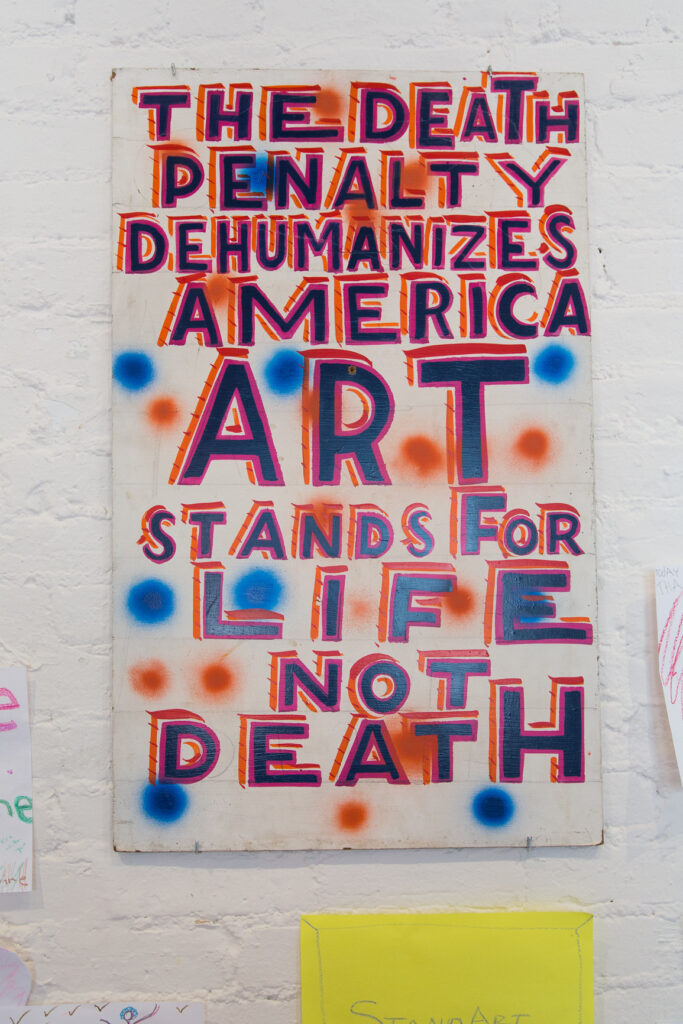Featured

Diary Entry: For Those Who Claim to be Pro-life — for Emmanuel Littlejohn and Many Others
September 29, 2024 By Guest Blogger Leave a Comment

Diary Entry: For Those Who Claim to be Pro-life — for Emmanuel Littlejohn and Many Others
For those who claim to be pro-life
For a justice system with as bad aim as two would be assassins.
More evidence against Donald Trump than against Emanuel Littlejohn
(But, the Lord is with us.)
Now He’s dead — killed by the same state mechanisms Christian Nationalist seek to enhance
And use to save the unborn babies
Just not grown men on death row.
Nope.
No contradictions there.
And, Trump is still endlessly [un]appealing
It’s got me holding my head in my hands
walking around just saying:
Damn to myself
A vehement percussive exhalation accompanied by a mantra of disgust
This diary entry of a mad Black man.
Who does this justice system serve?
Somewhere Malcolm, Abraham, Martin, and John watch, shake their heads
And refuse to weep.
Has anybody here seen my old friends?
Can you tell me where they’ve gone?

(By Heidi Lindemann and Michael Perry)
(image Credit 1: James Victore / MoMA)
(Image Credit 2: Bob and Roberta Smith: Art Amnesty / MoMA)

Oregon: If working people can’t afford to stay in the housing, it’s not affordable housing
September 27, 2024 By Guest Blogger Leave a Comment
What exactly is affordable housing? There’s much discussion these days, and finally, concerning an affordable housing crisis, the lack of affordable housing, the vast and growing numbers of households, families, individuals and communities living and struggling with housing insecurity, paying more than 30% of monthly income on household expenses and/or expecting to be evicted or […]

In Vancouver, why is the rent too damn high? (Hint: it’s not inflation or market changes)
August 27, 2024 By Guest Blogger Leave a Comment
Like most cities, Vancouver is an expensive place to live in. Located in British Columbia, Vancouver is the third largest metro area in Canada. According to a recent report, Vancouver is also the third least affordable housing market in the world, after Hong Kong and Sydney, Australia. For each of the last 16 years, […]

How many women and children in the Kiteezi Landfill collapse
August 15, 2024 By Guest Blogger Leave a Comment
The population of Kampala is currently estimated at 4,051,000. In 2014, it was 2,453,000. In twenty years, the city has grown 165%. The city has one garbage dump, the Kiteezi Landfill. It is the largest garbage dump in Uganda and in all of East Africa. It is located in a densely populated, low-income area of […]

The feudalism of eviction records
August 13, 2024 By Guest Blogger Leave a Comment
When is success a failure? When is a victory a loss? In eviction proceedings. Consider this: “Tenants in Massachusetts who struggle to find housing due to a prior eviction may now get the chance to have those records sealed. The Legislature’s newly passed housing bond bill includes a provision that would allow tenants to petition […]

Revolt — For Kamala Harris and the Women who could save an Ideal
August 4, 2024 By Guest Blogger Leave a Comment
Revolt — For Kamala Harris and the Women who could save an Ideal Revolt and find beauty in Life; or, in Death. Life has no value in a world without elegant Ideals. Ideals exist for us to navigate and to move towards; Without a North Star; Or, Southern Cross; Be lost as Ancient Mariners Strangled […]

From Mexico to the United States to the United Kingdom and beyond, there is no justice in women’s prisons
August 3, 2024 By Guest Blogger Leave a Comment
For over a year now, the news media have covered a class action lawsuit concerning the Federal Correctional Institution, Dublin, which argued that the women incarcerated at FCI-Dublin were routinely subjected to sexual violence, harassment, intimidation and other forms of brutality. This lawsuit is only one of over 60 that have been filed against […]

Cruelty: As eviction rates rise, more children are being listed on eviction proceedings
July 9, 2024 By Guest Blogger Leave a Comment
“Life is short and the world is at least half terrible” Maggie Smith, Good Bones Ron Padgett opens his poem “The Absolutely Huge and Incredible Injustice in the World” with a simple question, “Why are we so mean?” That question came to mind recently reading the opening to a news report, “A housing […]

Hathras District `stampede’ … and again we learn nothing
July 2, 2024 By Guest Blogger Leave a Comment
Mughalgarhi village is in Hathras District in Uttar Pradesh, in northern India. It’s about 220 miles south of the state capital, Lucknow. At some point today, over a hundred people, mostly women and children, were crushed and or suffocated to death at the end of a large gathering. Yet again. And, yet again, the […]

Our investment in cruelty and despair: Nauru continues
June 14, 2024 By Guest Blogger Leave a Comment
“I had said I wasn’t going to write no more poems like this I made a mistake” Gil Scott-Heron On Wednesday, the headline read: “What is our future?’: the Nauru detention centre was empty. Now 100 asylum seekers are held there”. We’re ba-a-a-ack! Not haunted by supernatural beings, but rather by our own supposedly […]

Prison conditions: “We have the resources. We just seem to not have the compassion”
May 17, 2024 By Guest Blogger Leave a Comment
No hurt I did not feel, no death That was not mine; mine each last breath That, crying, met an answering cry From the compassion that was I. Edna St. Vincent Millay Recently, three stories concerning dangerous, often fatal, prison conditions collided. In the United States, incarcerated people in Texas face a brutal summer […]